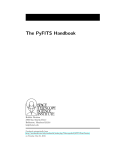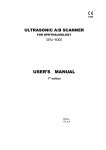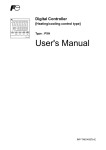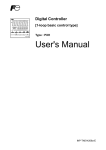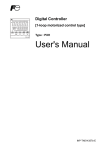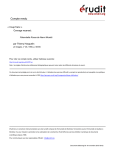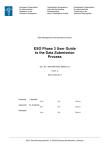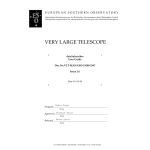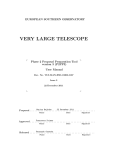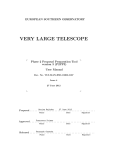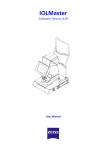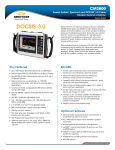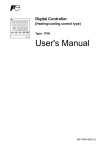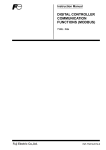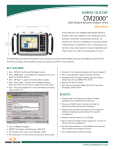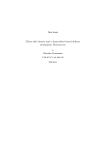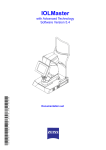Download to access the detailed User Manual for the ESO Catalogue Facility
Transcript
European Organisation
for Astronomical
Research in the
Southern Hemisphere
Organisation Européenne
pour des Recherches
Astronomiques
dans l’Hémisphère Austral
Europäische Organisation
für astronomische
Forschung in der
südlichen Hemisphäre
Data Management and Operations Division
Phase 3 User Documentation
ESO Catalogue Facility
User Manual
Doc. No.: GEN-MAN-ESO-33000-5789
Issue: 1
Date: 30/11/2012
Prepared:
J. Retzlaff
Name
Date
Signature
Name
Date
Signature
Date
Signature
Approved: M. Arnaboldi
Released:
M. Romaniello
Name
ESO, Karl-Schwarzschild-Str. 2, 85748 Garching bei München, Germany
ESO Catalogue Facility
User Manual
Doc:
Issue
Date
Page
GEN-MAN-ESO-33000-5789
1
30/11/2012
2 of 14
CHANGE RECORD
ISSUE
1
DATE
30/11/2012
SECTION/PARA.
AFFECTED
All
REASON/INITIATION
DOCUMENTS/REMARKS
Initial document.
ESO, Karl-Schwarzschild-Str. 2, 85748 Garching bei München, Germany
ESO Catalogue Facility
User Manual
Doc:
Issue
Date
Page
GEN-MAN-ESO-33000-5789
1
30/11/2012
3 of 14
TABLE OF CONTENTS
1 Overview ...........................................................................................................................................4 1.1 List of Features ..........................................................................................................................5 2 Getting started ...................................................................................................................................6 3 Choosing the catalogue of interest ....................................................................................................6 3.1 Displaying information about catalogues ...................................................................................6 3.2 Finding catalogues .....................................................................................................................7 3.3 Accessing previous versions .....................................................................................................7 4 Catalogue Queries ............................................................................................................................8 4.1 Search by position .....................................................................................................................9 4.1.1 Target name resolution.......................................................................................................9 4.1.2 List of Targets .....................................................................................................................9 4.2 Constraint per column ..............................................................................................................10 4.2.1 Sorting and query performance ........................................................................................11 4.3 Query Results ..........................................................................................................................12 4.4 Data Download ........................................................................................................................12 5 Requesting the entire catalogue .....................................................................................................13 6 Acknowledgements .........................................................................................................................14 ESO, Karl-Schwarzschild-Str. 2, 85748 Garching bei München, Germany
ESO Catalogue Facility
User Manual
1
Doc:
Issue
Date
Page
GEN-MAN-ESO-33000-5789
1
30/11/2012
4 of 14
Overview
The ESO Catalogue Facility provides access to the astronomical source catalogues and other
scientific data in tabular format that is being ingested into the ESO science archive through the Phase
3 process. It is designed to serve the catalogue data resulting from the ESO Public Surveys and other
ESO observing programmes including multi-colour photometric source catalogues, multi-epoch
photometry (a.k.a. light curves), catalogues of variables, proper motion catalogues, target catalogues
for spectroscopic surveys, galaxy redshift catalogues, catalogues of stellar properties and chemical
abundances.
The Catalogue Facility, developed by ESO’s Software Development Division, complements the
existing functionalities of the ESO Science Archive Facility by adding the capability to query each
catalogue by content using positional and non-positional constraints and, finally, to download the
resulting data set for further scientific analysis. To this end the catalogue data is stored in a dedicated
data base system from which the download data is extracted on request according to the constraints
and output format specified by the user.
The typical workflow using the Catalogue Facility consists of the following steps: 1) Choose the
catalogue of interest; 2) Define the query constraints; 3) Execute the query (SEARCH); 4) Review the
query result; 5) Refine the query constraints and repeat the search if needed; 6) Download the
catalogue data set resulting from the query (Figure 1).
ESO, Karl-Schwarzschild-Str. 2, 85748 Garching bei München, Germany
Doc:
Issue
Date
Page
ESO Catalogue Facility
User Manual
GEN-MAN-ESO-33000-5789
1
30/11/2012
5 of 14
Start
Choose
Catalogue of
Interest
Request
Entire
Catalogue
Data
Query
Catalogue
Data Set
Search & Download
Define Query
Constraints
Search & View
Download
New/Modify
Query
Review
Query Results
Figure 1: Illustration of the typical workflow using the Catalogue Facility. 1.1
List of Features
Release version number 1.1.6 of the ESO Catalogue Facility (Date: 02.10.2012) implements the
following features:
• Browse the available list of catalogues
• Inspect the catalogue content (metadata)
• Select the catalogue of interest
• Find catalogues by name
• Find catalogues by content (employing the Unified Content Descriptor vocabulary
recommended by the International Virtual Observatory Alliance)
• Search by position
o J2000 coordinates (HMS-DMS, decimal degree)
o Automatic target name resolution (by Sesame/CDS)
o Support for galactic coordinates (decimal degree)
o Multi-target search
• Constraint per column using ASU syntax for constraint qualification
• Sorting the result set (applies to the download data)
• Query results: total counts (records found).
• Tabular display (of top 1000 records).
• Pagination (displays 10, 20, 50 or 100 records per page)
• Free (re)arrangement of columns (show/hide)
• Sorting the displayed data (does not apply to the download data)
1
• Filter to inspect the result set (ASU-like syntax, apply, clear)
• Refine (modify) the query
• Download the query result set
• Supported download formats: FITS (binary table), CSV, TSV, VOtable, HTML
• Query the catalogue and download the resulting data immediately (skipping the display stage)
1
The user-defined filter applies to the tabular display but not to the download data.
ESO, Karl-Schwarzschild-Str. 2, 85748 Garching bei München, Germany
ESO Catalogue Facility
User Manual
•
2
Doc:
Issue
Date
Page
GEN-MAN-ESO-33000-5789
1
30/11/2012
6 of 14
Request the selected catalogue in its entirety for download from the ESO archive (FITS
format, no query)
Getting started
Being a web application, the ESO Catalogue Facility is reached by navigating the browser to the URL
http://www.eso.org/qi
First, you must logon using your ESO User Portal credentials, which then carries you to the main page
of the ESO Catalogue Facility.
Note: the user authentication expires after some idle time, after which you may need to authenticate
again.
Figure 2: ESO Catalogue Facility entry page 3
Choosing the catalogue of interest
The main page (Figure 2) provides an overview of all available catalogues once successfully ingested
into the ESO Archive via the Phase 3. The table displays title, release number and Phase 3
publication date for each catalogue.
3.1
Displaying information about catalogues
Click on the title to get detailed information about this catalogue and to inspect its kind of content
(Figure 3). The first tab shows the information pertaining to the entire catalogue. The second tab lists
ESO, Karl-Schwarzschild-Str. 2, 85748 Garching bei München, Germany
ESO Catalogue Facility
User Manual
Doc:
Issue
Date
Page
GEN-MAN-ESO-33000-5789
1
30/11/2012
7 of 14
all columns belonging to this catalogue including their names, descriptions, data type, size (in bytes),
Unified Content Descriptors (UCD) and physical unit. Use the browsers BACK button to return to the
main page.
Figure 3: Detailed information display for one selected catalogue 3.2
Finding catalogues
By default all catalogues are listed on the main page. The top panel allows finding catalogues by Title
and Content. The list of catalogues being displayed is restricted to the subset matching the input
constraints.
Enter keywords to match the catalogue title into the Title field or enter a word of the standard
vocabulary defined by the International Virtual Observatory Alliance, the so-called Unified Content
2
Descriptors (UCD 1+ controlled vocabulary ), into the Content field. Press Find to apply your
constraint.
To find all catalogues containing near-infrared K band data, for instance, enter EM.IR.K into the
Content field.
Note: the input keywords are matched against any substring of the catalogue title and UCDs
respectively. The matching is independent of character case.
3.3
Accessing previous versions
The ESO Phase 3 system supports and keeps track of the version history of data releases. You can
check the tick box “include obsolete versions” to get access to those ‘obsolete’ data for which a
more recent release version exists.
This function will be effective once DR2 catalogue data will have been ingested, presumably taking
place in 2013 for ESO/VISTA public surveys.
After having identified the catalogue of interest by clicking the appropriate SELECT button in the left
column, you continue with the next operations, either Query or Request.
2
The UCD1+ controlled vocabulary, Version 1.23, IVOA Recommendation 02 April 2007,
http://www.ivoa.net/Documents/latest/UCDlist.html
ESO, Karl-Schwarzschild-Str. 2, 85748 Garching bei München, Germany
ESO Catalogue Facility
User Manual
Doc:
Issue
Date
Page
GEN-MAN-ESO-33000-5789
1
30/11/2012
8 of 14
Press the Query button to search the catalogue based on your criteria and download the resulting
data set. Or Request the selected catalogue in its entirety for download from the ESO archive.
Figure 4: An example of the catalogue query form 4
Catalogue Queries
Querying the catalogue data using positional and non-positional constraints and downloading the
resulting data set for further scientific analysis are key functionalities provided by the system.
Having pressed the Query button on the main page, the query form for the selected catalogue
appears (Figure 4).
ESO, Karl-Schwarzschild-Str. 2, 85748 Garching bei München, Germany
ESO Catalogue Facility
User Manual
4.1
Doc:
Issue
Date
Page
GEN-MAN-ESO-33000-5789
1
30/11/2012
9 of 14
Search by position
The Catalogue Facility allows searching around one (Single Target) or multiple target positions (List
of Targets), using either a circular region (Cone) or a square (Box). The Size of the search region
specifies the maximum angular distance from the target position, i.e. the radius, in case of Cone
search and the side length of the square in case of Box search. You can define the Size in units of
arcsecond, arcmininute, or degree.
Note that the Search by position is available for all catalogues having equatorial (J2000) coordinates,
otherwise the panel does not appear. The two coordinates must be identified in the FITS header by
pos.eq.ra;meta.main and pos.eq.dec;meta.main set in the corresponding TUCDi keywords.
The Target field in case of the Single Target search accepts as input either a pair of coordinates or a
target name. The coordinates can be either J2000 (default) or galactic. In case of J2000 coordinates
either decimal degree or sexagesimal format (HMS/DMS) is possible.
Format of target coordinates (J2000)
(+)(dd)d.(ddd) (+/-‐)(dd)d.(ddd) (+)HH(:)MM((:)SS(.SSS)) +/-‐DD(:)MM((:)SS(.SSS)) Notes
The point preceding the
decimal part is mandatory,
even if the decimal part is
empty.
The +/- sign is mandatory
for the declination; seconds
and arcseconds are optional
for RA and Declination,
respectively.
Examples of valid target coordinate input (J2000):
150.1 2.2 10:00:24 +02:12 10 00 24 +02 12 10 00 +02 12 11.9 -‐25.3 00 47 36 -‐25 18 00 Galactic coordinates (longitude/latitude) should be specified in decimal degree.
4.1.1
Target name resolution
If the target input does not represent a valid pair of coordinates (according to the format defined
above), the Sesame name resolver at Centre de Données astronomiques de Strasbourg (CDS) is
employed and the resulting coordinates are used.
4.1.2
List of Targets
Press the Choose File button to load an input file containing the list of targets having the following
format. The file contains one target per line. The target can be expressed either as a name (to be
resolved by Sesame) or a pair of tab-separated J2000 coordinates. Blank lines are ignored as well as
lines starting with a hash ('#'). The user might use that feature to include comments into the input file.
Comments may contain HTML tags.
Optionally, a hash '#' may be added after the target information followed by any text comment. These
information will be propagated to the query results in the form of an additional table column (named
'comm').
ESO, Karl-Schwarzschild-Str. 2, 85748 Garching bei München, Germany
ESO Catalogue Facility
User Manual
Doc:
Issue
Date
Page
GEN-MAN-ESO-33000-5789
1
30/11/2012
10 of 14
Here are some examples:
HD 93308 # Variable Star 10 45 03.591 \tab -‐59 41 04.26 # eta car The strings “Variable Star” and “eta car” will then get added to the query results in the first column,
named 'comm'.
The queries are processed successively in the order of the input list and the results are also ordered
by target, as defined in the input list.
Figure 5: Example for the search by list of targets 4.2
Constraint per column
A flexible and powerful way for defining subsets of catalogue data according to your science case is
provided by constraint qualification per catalogue column (Figure 6). To this end the ASU syntax (cf.
3
Astronomical Server URL ) is employed. Within an ASU expression the parameter is implicit because
it is given by the context.
Table 1: Examples of search constraint expressions Expression
Description
5 =5 <=5 Matches values equal to 5 (default operator for numbers)
!=10 Matches values other than 10
1 .. 10 Range operator matches values between 1 and 10.
Note the spaces around the operator!
Matches ABC (default operator for strings)
ABC =ABC ABC% Matches values less than or equal to 5
~AbC Matches any string beginning with ABC.
% is the wildcard character.
Matches ABC, ABc, AbC, aBC, abC, abc (independent of character case)
!=abc% Matches any string not beginning with abc (not equal)
==ABC Matches ABC (exact string match, no wildcards)
aaa .. ccc Range operator for strings. Note the spaces around the operator!
3
http://vizier.u-strasbg.fr/doc/asu.html
ESO, Karl-Schwarzschild-Str. 2, 85748 Garching bei München, Germany
ESO Catalogue Facility
User Manual
>aaa Matches values greater than aaa
=abc | =def Logical OR
>1 & <10 Logical AND
!(>1 & < 10) Logical NOT
Doc:
Issue
Date
Page
GEN-MAN-ESO-33000-5789
1
30/11/2012
11 of 14
Strings containing blank characters, e.g. source designation, should be surrounded with double
quotes.
You can specify as many constraints as needed (including the possibility to combine with the Search
by position). Multiple constraints are combined in the boolean AND sense.
When all query constraints are specified, the search can be executed by pushing one of the buttons
on the query form, either Search & View or Search & Download, the difference being whether you
want to review the results before downloading them or whether you want to download directly skipping
the intermediate review step.
Figure 6: Specifying a range constraint on the Ks magnitude 4.2.1
Sorting and query performance
You can click on one of the UP/DOWN arrows on the left hand side of the query form to obtain a
sorted result set with respect to the respective catalogue parameter in ascending or descending order
(Figure 6).
The UP/DOWN arrow indicates at the same time that queries on the respective parameter are
4
optimized for best performance. It means that queries including conditions on these parameters
execute in a short time, which enables for instance colour interval selection even on very large
catalogues in an efficient way. Note that any other parameter can be constraint as well, with a lower
efficiency however, meaning that queries will take more time for execution and you need to wait longer
until the results are returned.
Large catalogues have up to 15 indexed columns, which are set up at the time of data ingestion
according to the PI/Co-I’s input. Therefore, Phase 3 data providers are asked to flag the catalogue
columns, which are considered most important from the scientific point of view for the purpose of
searching and subset definition.
4
Technically, an optimized database index has been defined for this parameter.
ESO, Karl-Schwarzschild-Str. 2, 85748 Garching bei München, Germany
ESO Catalogue Facility
User Manual
4.3
Doc:
Issue
Date
Page
GEN-MAN-ESO-33000-5789
1
30/11/2012
12 of 14
Query Results
If you choose Search & View the results are displayed on the query results page for inspection once
the query is executed (Figure 7). It shows the query constraints in the top panel, the number of
records found (i.e. matching the constraints) with respect to the total number of catalogue records
(“out of X”).
In the lower panel the data is displayed in tabular form. The viewer allows arranging the columns
interactively, sorting the data according to one column, and applying a filter to display a subset of the
data.
Note that the tabular view is limited to a maximum of 1000 records. It means the displayed data is
truncated to the top 1000 records if the result set exceeds 1000 records but the data for download is
not!
From the query results page the user may trigger one of the following operations: New Query, Modify
query, or Download.
4.4
Data Download
The catalogue data is stored in a dedicated data base system from which the download data is
extracted on request according to the user-specified constraints and output format.
Pushing the Download button (see Figure 7) will start the download process of the query result set to
your computer. The resulting file contains as many records as listed under “records found”; it is not
subject to the limit of 1000 records.
You can choose the download data format to be FITS (binary table), CSV (ASCII comma-separated
values), TSV (ASCII tab-separated values), VOTABLE, or HTML.
Note that the arrangement of columns in the tabular viewer applies to the download. Therefore,
remember to pull the red bar in the Columns panel below the last line to ensure that all columns are
included in the downloaded result set.
The downloaded data is sorted according to the column parameter selected for sorting in the query
form if any. The filter in the tabular viewer does not apply to the downloaded data.
ESO, Karl-Schwarzschild-Str. 2, 85748 Garching bei München, Germany
ESO Catalogue Facility
User Manual
Doc:
Issue
Date
Page
GEN-MAN-ESO-33000-5789
1
30/11/2012
13 of 14
Figure 7: Display of the query results 5
Requesting the entire catalogue
This function allows direct access to the catalogue data exactly as submitted by the data provider for
5
ingestion into the ESO archive via Phase 3.
After pressing the Request button to download the selected catalogue in its entirety from the ESO
archive, you are directed to the ESO Request Handler. Then, press the Submit button to confirm your
5
Exceptions are the FITS header keywords being updated or inserted in the course of the archiving process,
namely ARCFILE, CHECKSUM, DATASUM, ORIGFILE.
ESO, Karl-Schwarzschild-Str. 2, 85748 Garching bei München, Germany
ESO Catalogue Facility
User Manual
Doc:
Issue
Date
Page
GEN-MAN-ESO-33000-5789
1
30/11/2012
14 of 14
request. Thereafter, the list of files belonging to the selected catalogue is displayed, including filesize
in bytes, and you can download the data to your computer.
6
Acknowledgements
The Catalogue Facility has been developed by ESO’s Software Development Division. The usage of
the Spherical Geometry Toolkit (Budavari, T., Szalay, A., & Fekete, G. 2010, Publications of the
Astronomical Society of the Pacific, 122, 1375) and of the VOview package, which was originally
written for the Hubble Legacy Archive, is acknowledged. The ESO Catalogue Facility employs the
Sesame name resolver operated at the Centre de Données astronomiques de Strasbourg (CDS).
ESO, Karl-Schwarzschild-Str. 2, 85748 Garching bei München, Germany














